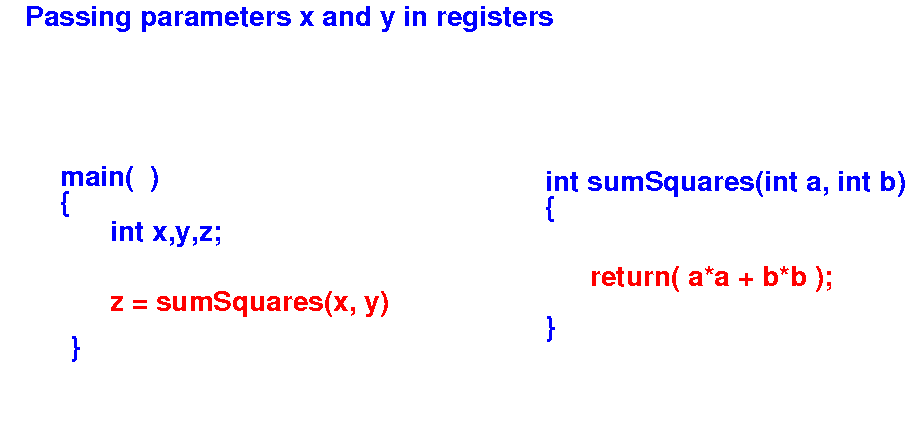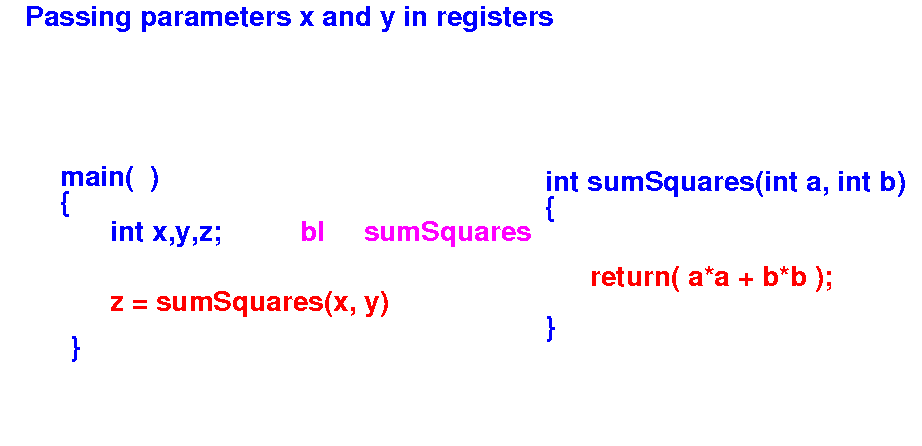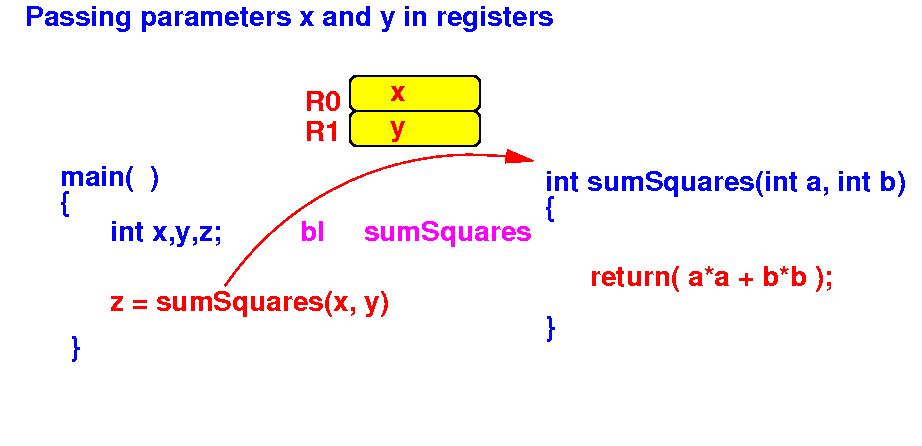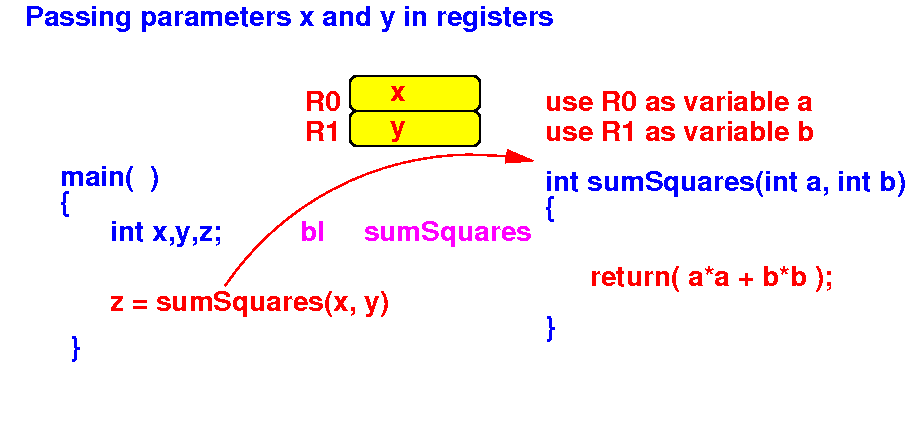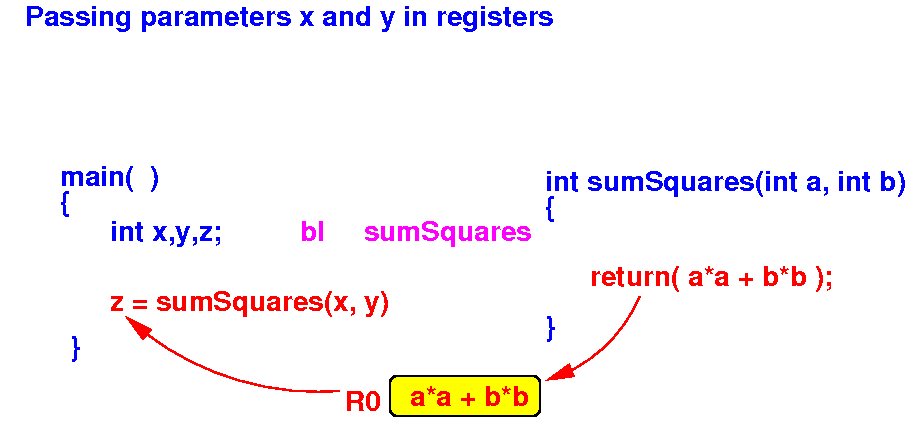|
|
|
|
|
|
We can now code the main( ) function:
main: sumSquares:
// Pass x in r0 // Compute x*x+y*y
// where x = r0 and y = r1
// Pass y in r1
// Return result in r0
bl sumSquares mov pc, lr
// Store return value
// in z
Stop:
|
Pass the 1st parameter in register r0:
main: sumSquares:
movw r0, #:lower16:x // Compute x*x+y*y
movt r0, #:upper16:x // where x = r0 and y = r1
ldr r0, [r0]
// Pass y in r1
// Return result in r0
bl sumSquares mov pc, lr
// Store return value
// in z
Stop:
|
Pass the 2nd parameter in register r1:
main: sumSquares:
movw r0, #:lower16:x // Compute x*x+y*y
movt r0, #:upper16:x // where x = r0 and y = r1
ldr r0, [r0]
movw r1, #:lower16:y
movt r1, #:lower16:y
ldr r1, [r1] // Return result in r0
bl sumSquares mov pc, lr
// Store return value
// in z
Stop:
|
When sumSquares( ) returns, assign the return value (in the designated register r0) to variable z:
main: sumSquares:
movw r0, #:lower16:x // Compute x*x+y*y
movt r0, #:upper16:x // where x = r0 and y = r1
ldr r0, [r0]
movw r1, #:lower16:y
movt r1, #:lower16:y
ldr r1, [r1] // Return result in r0
bl sumSquares mov pc, lr
movw r1, #:lower16:z
movt r1, #:upper16:z
str r0, [r1]
Stop:
|
We can code the sumSquares( ) function using the designated registers for parameters and return values:
main: sumSquares:
movw r0, #:lower16:x // Compute x*x+y*y
movt r0, #:upper16:x // where x = r0 and y = r1
ldr r0, [r0]
movw r1, #:lower16:y
movt r1, #:lower16:y
ldr r1, [r1] // Return result in r0
bl sumSquares mov pc, lr
movw r1, #:lower16:z
movt r1, #:upper16:z
str r0, [r1]
Stop:
|
Compute x*x:
main: sumSquares:
movw r0, #:lower16:x // Compute x*x+y*y
movt r0, #:upper16:x // where x = r0 and y = r1
ldr r0, [r0] mul r2, r0, r0 // r2 = x*x
movw r1, #:lower16:y
movt r1, #:lower16:y
ldr r1, [r1] // Return result in r0
bl sumSquares mov pc, lr
movw r1, #:lower16:z
movt r1, #:upper16:z
str r0, [r1]
Stop:
|
Compute y*y:
main: sumSquares:
movw r0, #:lower16:x // Compute x*x+y*y
movt r0, #:upper16:x // where x = r0 and y = r1
ldr r0, [r0] mul r2, r0, r0 // r2 = x*x
mul r3, r1, r1 // r3 = y*y
movw r1, #:lower16:y
movt r1, #:lower16:y
ldr r1, [r1] // Return result in r0
bl sumSquares mov pc, lr
movw r1, #:lower16:z
movt r1, #:upper16:z
str r0, [r1]
Stop:
|
Compute x*x + y*y:
main: sumSquares:
movw r0, #:lower16:x // Compute x*x+y*y
movt r0, #:upper16:x // where x = r0 and y = r1
ldr r0, [r0] mul r2, r0, r0 // r2 = x*x
mul r3, r1, r1 // r3 = y*y
movw r1, #:lower16:y add r2, r2, r3 // r2 = x*x+y*y
movt r1, #:lower16:y
ldr r1, [r1] // Return result in r0
bl sumSquares mov pc, lr
movw r1, #:lower16:z
movt r1, #:upper16:z
str r0, [r1]
Stop:
|
Return the result in the designated register r0:
main: sumSquares:
movw r0, #:lower16:x // Compute x*x+y*y
movt r0, #:upper16:x // where x = r0 and y = r1
ldr r0, [r0] mul r2, r0, r0 // r2 = x*x
mul r3, r1, r1 // r3 = y*y
movw r1, #:lower16:y add r2, r2, r3 // r2 = x*x+y*y
movt r1, #:lower16:y
ldr r1, [r1] mov r0, r2
bl sumSquares mov pc, lr
movw r1, #:lower16:z
movt r1, #:upper16:z
str r0, [r1]
Stop:
|
DEMO: /home/cs255001/demo/asm/8-sub/reg-param1.s
